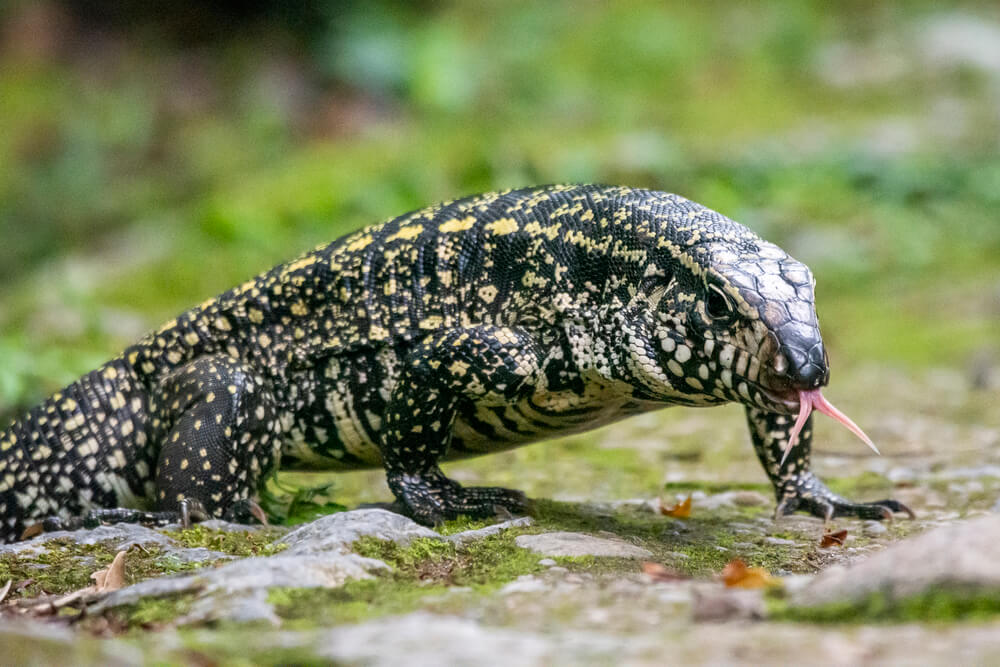While it’s true that tegus can sometimes be asexual, there’s still a lot we don’t know about these strange creatures. Are they capable of living without a mate? And if so, why? Let’s explore the mystery of the asexual tegu!
How Do Tegus Reproduce?
Tegus are a type of lizard native to Central and South America that have gained in popularity as exotic pets. Though they have been kept as household pets since the 1960s, much is still unknown about their reproductive process.
It has been observed that tegus reproduce sexually, meaning that they need mating partners to produce offspring. The bulk of copulation seems to occur during the dry season before their mating season’s peak, which generally ensues in October.
After mating is complete, female tegus typically lay between 4 and 16 eggs in April or May in burrows dug into the soil with guarded ferocity.
After roughly 60-90 days, the young hatchlings will emerge from the soil excavated by their mother often under cover of darkness apiece with thoughtfully designed camouflage patterns ready to stand on their own!
Can Asexually Tegus Reproduce?
Asexually-reproducing tegus, a species of large lizards found throughout Central and South America, have been the subject of much scientific interest in recent years. This is because, despite their normal sexual behavior, tegus are capable of producing offspring through asexual reproduction.
While a few isolated instances have been documented in the wild and captivity, it is still unclear what triggers this behavior, or whether it could be widespread among the species.
In any case, research has shown that asexually-reproducing tegus generally show slower growth rates than those produced sexually;
this is of particular value to conservationists as it indicates that their populations are capable of succeeding even under extreme conditions where sexual breeding may not be possible.
Do Tegus Need a Male To Reproduce?
Tegu lizards are rapidly gaining popularity amongst house-pet owners, but due to their naturally solitary nature, many wonders: do Tegus need a male to reproduce? In most cases, the answer is no.
Unlike many other species of reptiles, Tegu males lack the specific hormones and behaviors that cause them to take dominance over females during courting and mating. As such, female tegus can lay viable eggs without being presented with a male.
In cases where eggs are laid without any contact with a male lizard, they will still hatch and the resulting offspring will be female since parthenogenesis (asexual reproduction) is not typical for this species of reptile.
What animals produce asexuality?
Asexual reproduction is a fascinating form of reproduction where only one parent is required. It’s primarily found in single-celled organisms, but some animals engage in asexual forms of reproduction.
Many insects are capable of producing offspring without another parent – including beetles, bees, and flatworms – while lizards such as the whiptail lizard reproduce exclusively through parthenogenesis.
Fish, too, can produce offspring asexually, with freshwater species like the kuhli loach and some marine species such as paradise fish demonstrating this reproductive method.
Despite its widespread prevalence among various animal species, however, its true evolutionary advantage remains to be seen.
How intelligent are tegus?
Tegus truly are one of the most intelligent reptile species, with aviaries and other research centers having recorded them doing remarkable things. For example, they have been trained to recognize their names when called and can even find hidden treats if presented with an incentive.
Furthermore, tegus have been seen to show certain types of problem-solving abilities such as how to open latches and other obstacles to access food that is out of reach. All this evidence points towards them being able to learn tasks quickly and retain the information;
characteristics not seen in most reptiles. Ultimately, it is clear that tegus are much more intelligent than first assumed from their appearance alone.
Conclusion
Scientists are still uncovering the many mysteries of these animals, but it seems that they have a lot more in common with us than we thought. Though we may never know for sure whether or not tegus are truly asexual, one thing is for certain: they are fascinating creatures.














